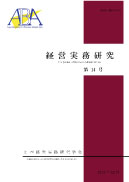Volume 2018, Issue 13
Displaying 1-4 of 4 articles from this issue
- |<
- <
- 1
- >
- >|
-
2018Volume 2018Issue 13 Pages 1-14
Published: 2018
Released on J-STAGE: May 11, 2020
Download PDF (309K) -
2018Volume 2018Issue 13 Pages 15-29
Published: 2018
Released on J-STAGE: May 11, 2020
Download PDF (828K) -
2018Volume 2018Issue 13 Pages 31-49
Published: 2018
Released on J-STAGE: May 11, 2020
Download PDF (426K) -
2018Volume 2018Issue 13 Pages 51-63
Published: 2018
Released on J-STAGE: May 11, 2020
Download PDF (453K)
- |<
- <
- 1
- >
- >|
